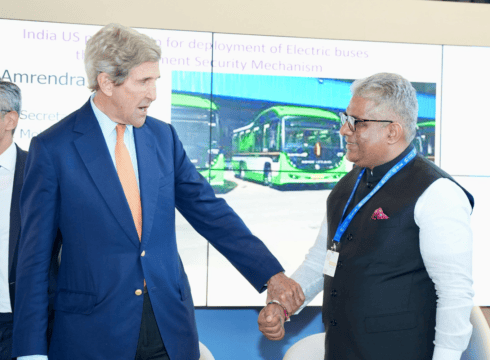The $390 Mn fund will act as a guarantee for manufacturers seeking credit to ramp up production of ebuses
The payment security mechanism has been established with a $240 Mn corpus from the Indian government, while the remaining came from the US government and philanthropic groups
The initiative will help the sector tide over issues such as capital crunch, high upfront costs and lower realisation of revenue from operations as India rapidly scales up EV adoption
Inc42 Daily Brief
Stay Ahead With Daily News & Analysis on India’s Tech & Startup Economy
India has partnered the US government and American philanthropic groups, as part of a $390 Mn joint financing mechanism, to deploy more than 50,000 electric buses on the country’s roads by 2027.
Indian and US officials told Bloomberg that the $390 Mn fund will act as a collateral/ guarantee for manufacturers seeking credit to ramp up production of ebuses. The move will enable the homegrown original equipment manufacturers (OEMs) to mitigate risks and ease access to capital.
Called the payment security mechanism (PSM), the project has been established with a $240 Mn corpus from the Indian government while the remaining came from the US government and philanthropic groups.
The announcement was made at the 2023 United Nations Climate Change Conference, colloquially called COP28, currently being held in Dubai.
Mahua Acharya, the managing director and chief executive officer of the state-owned Convergence Energy Services, reportedly said that the mechanism is the ‘bedrock of risk management for building out the financial system for electric mobility at scale in India.’
During the event, US special envoy on climate change John Kerry, as per news agency PTI, termed the electrification of the Indian transport sector as one of most significant opportunities.
“Electrification in India is one of the biggest opportunities that we have. The faster that India can do this, the more it cuts greenhouse gas emissions and it cuts pollution, it increases India’s security,” Kerry said.
Calling the mechanism a collaborative effort, Kerry said the focus of the project is on implementing Indian solutions to maximise domestic opportunities, particularly to decarbonise the transportation sector.
“The India-US PSM for ebuses will serve as an incentive for both Indian and international OEMs or bus operators to participate in ebus operations and potentially establish a manufacturing hub in India, contributing to the growth of ebus industry and ebus exports,” environment minister Bhupendra Yadav, who was also present at the event, said.
The initiative will help the sector tide over capital crunch as India rapidly scales up EV adoption in the country. The ebuses manufacturing ecosystem continues to be marred by a slew of issues such as high upfront costs and lower realisation of revenue from operations.
With the financing mechanism, the government aims to create an incentive for companies to avail credit without worrying about guarantees in lieu of these loans.
Alongside, the push is also expected to give a major push to the Indian EV manufacturing ecosystem. While India currently has 12,000 electric buses plying on the roads, the country aims to rapidly scale this number as it looks to achieve its target of electrifying 40% of total buses plying on the Indian roads by 2030.
This comes months after the Centre approved an INR 57,000 Cr scheme to deploy 10,000 electric buses in 169 cities on a public-private partnership (PPP) model. Besides, electric maker PMI Electro Mobility Solutions also raised INR 250 Cr in a strategic funding round from Piramal Alternatives earlier this year.
{{#name}}{{name}}{{/name}}{{^name}}-{{/name}}
{{#description}}{{description}}...{{/description}}{{^description}}-{{/description}}
Note: We at Inc42 take our ethics very seriously. More information about it can be found here.


